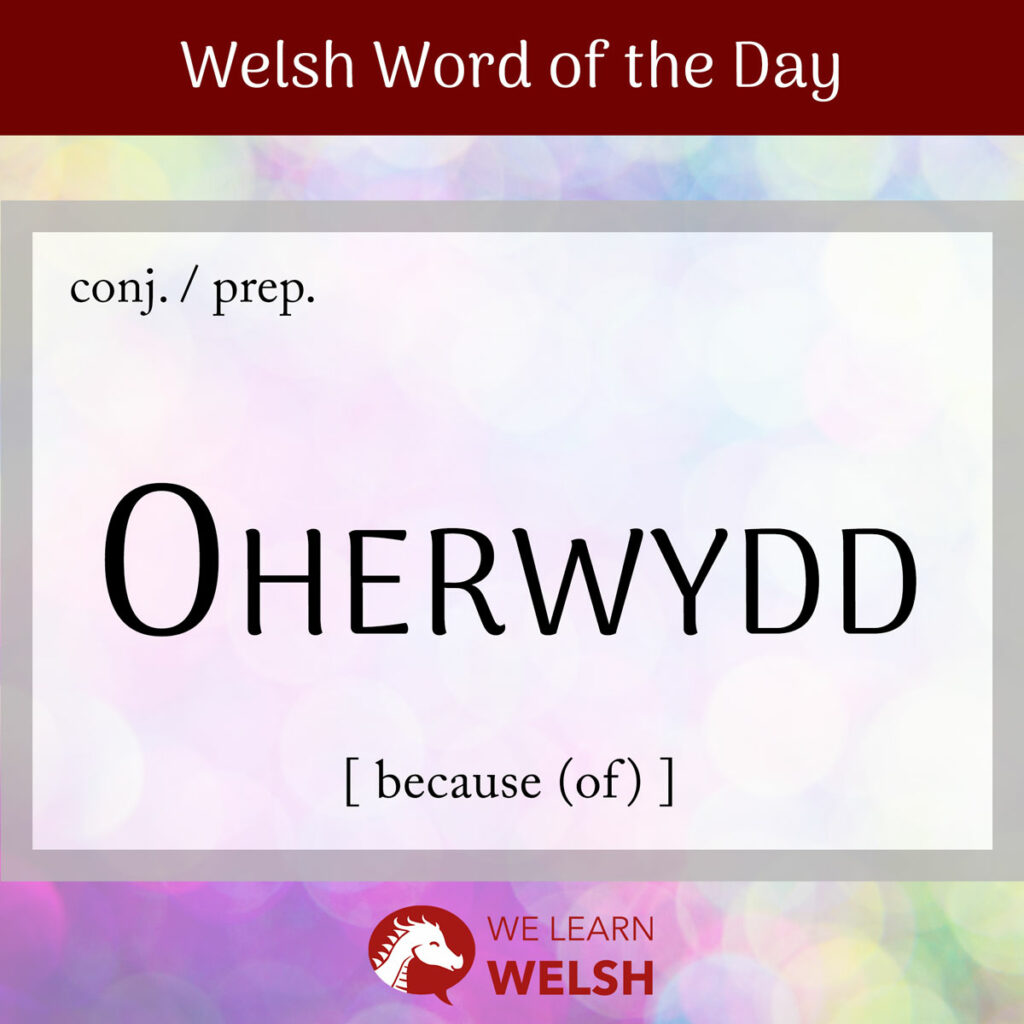Have you ever been asked why you’re learning Welsh? Whether your go-to answer is because you love Welsh history and culture, because you live in Wales and want to use it professionally and personally, or simply because learning languages is good for the brain, you need to know how to say because in Welsh!
Luckily, there are a lot of ways to do this. The two most common are the words achos and oherwydd, and today we’re going to talk about oherwydd.
oherwydd
because
Oherwydd is actually based on an earlier word, which is herwydd / erwydd, now obsolete. Herwydd evolved from the proto-Celtic *ari-u̯id.
Herwydd could be used as a noun to mean cause, or as a preposition meaning with respect to a certain cause. The preposition o (from / of) was added to the beginning of it, making a word that essentially means from this cause. The earliest forms of oherwydd that we have records of in Welsh are as o erwydd hyn (because of this).
You can use oherwydd in two main ways. Both of them are in order to explain the rheswm (reason) for something. Firstly, you can use it as a preposition, to mean because of. Really, this is what it literally means (since it has the o already included in it, which functions as an of here). So in this case, it’s simply followed by a noun or a noun-phrase.
Rydyn ni’n aros gartref heddiw, oherwydd y tywydd gwael.
We’re staying at home today, because of the bad weather.
You can’t use achos in this way – you’d have to use o achos instead.
Secondly, you can use oherwydd as a conjunction to mean because, just like in English. In this case, rather than being followed by a noun or noun-phrase, it’s followed by a statement. This is technically a more modern usage of oherwydd, but don’t worry – it’s now considered completely correct. In this usage, it’s synonymous with achos.
One important thing to remember when using oherwydd or achos to mean because is that they should be followed by bod (the verb-noun “to be”) rather than mae (the present tense form of bod) or any other conjugated form of the verb.
Rydyn ni’n aros gartref heddiw, oherwydd bod y tywydd yn wael.
We’re staying at home today because the weather is bad.
You use mae when asking the initial question, such as Pam mae…? (Why is…?). Alternatively, you might use another conjugation that matches the subject and tense, like Pam wyt ti…? (Why are you…?), where wyt is the second-person singular present tense form of bod.
Oherwydd mae / achos mae is becoming more and more common, especially in informal speech. But if we’re being pedantic, oherwydd bod / achos bod is the correct form.
There is also the option of using mai instead of bod after oherwydd / achos. Despite how it looks, mai is not a synonym of mae, though they are pronounced in the same way. Mae is the third-person present form of bod, whereas mai is a linking word that is required when the second sentence doesn’t start with a verb. Compare the following two sentences:
Dw i’n hoffi byw yng Nghymru (I like living in Wales) + MAE fy nheulu’n byw yma (My family lives here)
= Dw i’n hoffi byw yng Nghymru oherwydd BOD fy nheulu’n byw yma. = I like living in Wales because my family lives here.
Dw i’n hoffi byw yng Nghymru (I like living in Wales) + Yma mae fy nheulu’n byw (Here my family lives – emphatic statement)
= Dw i’n hoffi byw yng Nghymru oherwydd MAI yma mae fy nheulu’n byw. = I like living in Wales because here my family lives.
‘Emphatic sentences’ are just a different way of phrasing sentences, where the verb doesn’t go at the start of the sentence like it usually would in Welsh. As the name suggests, they add a little bit of extra positive emphasis to the statement.
Note that taw (south) and ‘na (north) are both synonyms of mai. Mai is overall more Northern, but is pretty standard. Taw is the most common choice in the South. ‘Na is a colloquial variation you might hear in the North-West.
Learning to use emphatic sentences adds a bit of flavour to your speech patterns and can make you sound more like a native speaker, but you don’t need to know how to use them in order to use oherwydd. If you stick with oherwydd bod, you’ll be fine. It’s just worth mentioning so that you don’t get your mae and your mai mixed up!
Oherwydd bod y Gymraeg yn gymhleth!
Because Welsh is complicated!
The other thing that’s quite cool about oherwydd is that because herwydd was originally a separate word, you can still split the modern version up into o + herwydd and play around with it a bit! Here are some examples:
- o’r herwydd = so / for the reason just stated
- o’u herwydd = because of them
- o’th / o’ch herwydd = because of you
- o’m herwydd = because of me
- o’n herwydd = because of us
- o’i herwydd = because of her/him/it
If you wanted to do the same thing with achos, you’d have to use use the o achos form – o’ch achos (because of you), for example.
Other translations of because include am and gan, which, like with achos and oherwydd, should technically be followed with bod rather than by a conjugation of it. I’d say that am or gan are usually used when the reason for something is not as important, or doesn’t need as much explaining.

Oherwydd sounds more flowery than the other ways of saying because. It’s what I would have used in essays at school.
There is also oblegid, which is a pretty direct equivalent to oherwydd. As you can see, it’s got that o prefix in front of it. This means that it can be used to mean because of in the same way as oherwydd, and that it’s slightly more formal.
Whew! To sum up: you can use oherwydd to mean because or because of, and there are also useful variants of it like o’r herwydd (for that reason). It’s followed by bod (not a conjugation of bod) when used as a conjunction, and by a noun or noun-phrase when used as a preposition. It sounds good in formal writing, but it’s more common to substitute it with achos / o achos in daily conversation.

